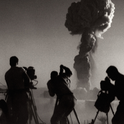‘Why, this is hell, nor am I out of it:’ (Doctor Faustus)
In last night’s final episode of Breaking Bad, one of the minor characters summed it up: "The whole thing felt really shady, morality-wise." In the final episode, as all through the series, we are in a grey zone. The more the bodies pile up, the greyer it gets, the further away we are from the black and white morality tales of 20th century US television. What makes Breaking Bad the greatest US TV drama series is not just the great acting, writing and directing. It is also the mix of violence, moral complexity and the underlying politics of gender and modern America.
Walter White’s critics attack his cruelty – his lies, his grandiosity, his violence. He lies to those nearest to him. Jesse, Hank and Mariea, but especially to his wife, Skyler, and son, Walter Jr. All she ever wanted was to build a firewall around their home. To stop the criminal world he had embraced destroying their family. But at the moral centre of this most deeply moral of dramas is a simple truth. Evil corrupts absolutely. You can’t go into that world of vicious killers by day and come home, safe and sound, at night.
Walt’s fans, however, are not for budging. "Too much hate for Walter White," said one tweet (is this the first great TV drama of the Twitter age which has been passionately debated by viewers scene by scene?). "Everything he did after finding out he had terminal cancer was to protect his family." They still see White as a victim, a good man who finds himself out of his depth. Everything he does he does for his family. He is a loving father and husband, a good teacher, overwhelmed by circumstances beyond his control. That’s why White is Mr Chips-become-Scarface.
This is the issue at the heart of the political debate over Breaking Bad, the moment at which a debate about morality becomes a debate about politics and modern America. Walter White is the embodiment of white rage in turn of the century America. He is the successor to Michael Douglas’s character in Falling Down. Early on, a hospital psychiatrist asks White why he disappeared. "My wife is seven months pregnant with a baby we didn’t intend. My 15-year-old son has cerebral palsy. I am an extremely overqualified high school chemistry teacher. When I can work I make $43,700 per year. I have watched all of my colleagues and friends surpass me in every way imaginable and within 18 months I will be dead. And you ask why I ran?" This speech is at the heart of Breaking Bad. It is a strange coincidence that the first season was shown in 2008, months before the global recession began. This is TV for the post-2008 era.
There is a second twist to the White debate that erupted with astonishing force in one of the last episodes, “Ozymandias”. In American TV and films you can always tell the good guy. He’s the one with the family. From The Searchers to Star Wars and Kevin Costner’s home in JFK, goodness was the family home. Evil was what lay outside, loners, men without families, killers. The great male characters in American TV drama and cinema are the men who cross the boundary: Ethan Edwards in The Searchers, Michael Corleone in The Godfather, Walter White in Breaking Bad.
Breaking Bad begins with a suburban family home. A husband, wife and teenage son (and later a second child). The baddies have no children. They don’t have a home. The Mexican drug killers and Jack’s racist psychos inhabit an all-male world, often a compound. Walter’s wife tries to defend her home against this world and increasingly against her husband. However, many of the best scenes of the final episodes involve violent men breaking into homes and threatening the couples or families who live there. The Whites’ home is destroyed. Walter starts out as the quintessential family man. He ends up as an outsider, on the run, desperate for contact with his family, caught in a powerful sequence of Walter gazing at his son.
The moment when Skyler goes for Walt with a knife and he throttles her, is the moment when the White family finally falls apart. Of course, this has been on the cards from the beginning. It started with lies but ends in the White house with husband and wife fighting each other on the floor, with Walt running away with their daughter and Skyler left screaming in the road, bloody, anguished. And we know worse is to come. Walt will return, like Ulysses, to find his suburban home burnt out, with ‘Heisenberg’ written on the walls.
The border between the all-American home and Evil is one boundary. There is another border running through Breaking Bad which speaks to other American anxieties. Indeed, it is the issue that decided the last American election. Breaking Bad is set in New Mexico, but the real setting is the desert border between America and Mexico. Apart from Jack’s vicious, crazy gang, the real baddies throughout the series are Mexicans, either living in New Mexico or coming from Mexico. This is the new Wild West, first mapped by Sergio Leone and the spaghetti Westerns and recently reinvented by Cormac McCarthy and then the Coen Brothers in their masterpiece, No Country for Old Men.
Vince Gilligan’s talented directors have drawn on the iconography of the Western, but especially the Spaghetti Western. This is the latest, and one of the best, depictions of the desert borderland that haunts the contemporary American imagination. The great, unforgettable sequences in Breaking Bad take place in the desert. This is where Walt goes to make drugs, where he returns to bury his money, where his brother-in-law, the representative of law and order, is killed like a dog.
Its power comes, as it always did in the great Westerns, from the overlap between two landscapes: the beautiful landscape of the traditional Western and the landscape as metaphor. This desert is where Evil is. The border between the city and the desert runs through the series. It is the same as the border between Good and Evil. The problem is that increasingly the borders will not hold. The town where Walter White teaches and raises his family cannot be protected from the forces of darkness outside. The darkness moves from outside to inside.
The increasingly desperate attempts by Walt’s admirers to defend him show how hard we all cling to the image of the hero, the family man, the apparently good man fallen on hard times. But like Faustus he has been damned by his pact with the devil. But these tweets and e-mails also tell us a larger truth about America today. The anger of the American white (especially male) middle class is real. Good people have had their world turned upside down and it is not yet clear how they will react. Breaking Bad is the great drama of what has happened to America in our lifetime.

Like Faustus, Walter White has been damned by his pact with the devil
In Praise of Breaking Bad and The Golden Age
Walter White has been damned by his pact with the devil; but the morality debate tells us a larger truth about America today
September 30, 2013











